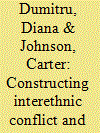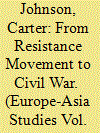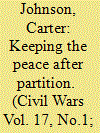|
|
|
Sort Order |
|
|
|
Items / Page
|
|
|
|
|
|
|
| Srl | Item |
| 1 |
ID:
102706


|
|
|
| 2 |
ID:
174390


|
|
|
|
|
| Summary/Abstract |
This article compares resistance movements along the western borderlands of the Soviet Union between 1944 and 1952. Despite similar levels of state repression and local grievances, Moldova’s opposition movement did not escalate to the level of civil war, whereas civil wars emerged across the Baltic states, Belarus, and Ukraine. Through theory development and testing, the article compares Lithuania and Moldova, identifying the role of previous regime behaviour, the speed of Soviet takeover, and the availability of safe havens within Moldova and Lithuania as the key causal factors explaining the difference.
|
|
|
|
|
|
|
|
|
|
|
|
|
|
|
|
| 3 |
ID:
144444


|
|
|
|
|
| Summary/Abstract |
This paper examines partition as a solution to ethnic civil wars and modifies the ethnic security dilemma, suggesting that strong state institutions are more important than demographically separating ethnic groups to achieve an enduring peace. The paper starts with a puzzle: if ethnic separation is required for peace, how do some partitions that leave minorities behind maintain peace? The paper compares post-partition Georgia–Abkhazia, which experienced violence renewal within five years of the partition, with post-partition Moldova–Transnistria, which maintained peace. Both countries had ‘stay-behind’ ethnic minorities. The paper also disaggregates and compares the territories within post-partition Abkhazia, which contain ethnic Georgians: Lower Gali experienced violence while neighboring Upper Gali did not. The paper argues that state institutions create an incentive for ethnic minorities to collaborate with the state, regardless of minority preferences, and this helps maintain peace. However, preferences become important where institutions are weak and members of the ethnic minority have the opportunity to defect; this increases the likelihood of violence. The results build on the ethnic security dilemma by specifying micro-mechanisms and challenging the theory's reliance on intransigent ethnic identities in explaining the causes of post-partition violence.
|
|
|
|
|
|
|
|
|
|
|
|
|
|
|
|
| 4 |
ID:
080965


|
|
|
|
|
| Publication |
2008.
|
| Summary/Abstract |
Some scholars have proposed partition as a way to solve ethnic civil wars. Partition theorists advocate the demographic separation of ethnic groups into different states, arguing that this is the best chance for an enduring peace. Opponents argue that partition is costly in terms of its human toll and that its advocates have yet to demonstrate its effectiveness beyond a limited number of self-selected case studies. This analysis systematically examines the outcome of partition, highlighting the centrality of demography by introducing an index that measures the degree to which a partition separates ethnic groups. This index is applied to all civil wars ending in partition from 1945 to 2004. Partitions that completely separated the warring groups did not experience a recurrence of war and low-level violence for at least five years, outperforming both partitions that did not separate ethnic groups and other ethnic war outcomes. These results challenge other studies that examine partition as a war outcome. The results also have direct implications for Iraq's civil war, postindependence Kosovo, and other ethnic civil wars
|
|
|
|
|
|
|
|
|
|
|
|
|
|
|
|
|
|
|
|
|